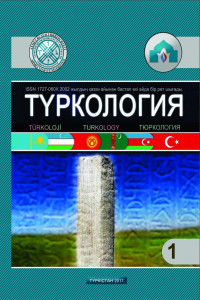FEATURES OF SPIRITUAL AND MORAL TEACHING OF NIZAMI GYANJEVI
The article reveals the ethical aspect inherent in the teachings of Nizami Ganjavi. The role and place of the great Azerbaijani poet and thinker in the history of world spirituality are considered. The authors analyze the originality, uniqueness of the poetic creativity of Nizami, who called each person to spiritual and moral self-improvement. He argued that the most important component of a person's being is his soul, which is the bearer of the highest moral qualities - friendship, love, humanity, etc. The main hero of his works is the people, artisans. All the poet's sympathies are on their side. On the example of his poem "Khamsa", such moral categories as good, cruelty, evil, happiness, the meaning of life, etc. are explored. Important importance is given to revealing the personality of the poet-thinker Nizami as a humanist, a subtle psychologist, a great connoisseur of the human soul. It is shown that morality plays the main line in the formation of a person, his spirituality. This is evidenced by the numerous works of Nizami Ganjavi, in which the man of labor, the true bearer of the spirituality and culture of the people, is glorified. It also touches upon other ethical problems set forth in the works of the great thinker. In general, the teachings of Nizami Ganjavi affirm truly humanistic moral principles in society.
Anahtar Kelimeler:
singer of justice, humanism, "Khamsa", morality, values
FEATURES OF SPIRITUAL AND MORAL TEACHING OF NIZAMI GYANJEVI
The article reveals the ethical aspect inherent in the teachings of Nizami Ganjavi. The role and place of the great Azerbaijani poet and thinker in the history of world spirituality are considered. The authors analyze the originality, uniqueness of the poetic creativity of Nizami, who called each person to spiritual and moral self-improvement. He argued that the most important component of a person's being is his soul, which is the bearer of the highest moral qualities - friendship, love, humanity, etc. The main hero of his works is the people, artisans. All the poet's sympathies are on their side. On the example of his poem "Khamsa", such moral categories as good, cruelty, evil, happiness, the meaning of life, etc. are explored. Important importance is given to revealing the personality of the poet-thinker Nizami as a humanist, a subtle psychologist, a great connoisseur of the human soul. It is shown that morality plays the main line in the formation of a person, his spirituality. This is evidenced by the numerous works of Nizami Ganjavi, in which the man of labor, the true bearer of the spirituality and culture of the people, is glorified. It also touches upon other ethical problems set forth in the works of the great thinker. In general, the teachings of Nizami Ganjavi affirm truly humanistic moral principles in society.
Keywords:
singer of justice, humanism, "Khamsa", morality, values,
___
- 1. Nizami. Five poems. Library of World Literature. Series one. M., Publishing house "Khudozhestvennaya literatura", 1968.- 345 p.
- 2. Khalil Yusifli. Renaissance and Nizami Ganjavi. Baku, "Elm ve tehsil", 2016. - 426 p.
- 3. Shukurova G.V. Jafar Khandan about the work of Nizami Ganjavi. // Zh-l “Philological sciences. Questions of theory and practice ". Tambov: Diploma, 2019. Volume 12. Issue 10. P. 87-91.
- 4. Bertels E. Nizami. Young guard. 1948 .-- 262 p.
- 5. Jamal Mustafayev. Philosophical and ethical views of Nizami. Baku, 1962 .-- 234 p.
- 6. Bertels E. The great Azerbaijani poet Nizami. Era - Life - Creativity. Publishing house AzFAN. Baku - 1940.-147 s.
- 7. Sukhomlinsky A.V. The science of winning. Pedagogical works. M., "Education", 1975. - 291 p.
- 8. Electronic resource: http://azeribook.com (History of Azerbaijan). - Date of treatment: 10/13/2021.
- 9. Sufism in the context of Muslim culture. M., "Science", 2019. - 372 p.
- 10. Krymskiy A.E. Nizami and his contemporaries. Baku: "Elm", 1981. - 247 p.
- ISSN: 1727-060X
- Başlangıç: 2002
- Yayıncı: Hoca Ahmet Yesevi Uluslararası Türk-Kazak Üniversitesi
Sayıdaki Diğer Makaleler
RİTÜELDEN KÖY SEYİRLİK OYUNUNA: ŞİŞMAN OYUNU ARDAHAN BAĞDEŞEN KÖYÜ ÖRNEKLEMİNDE
FEATURES OF SPIRITUAL AND MORAL TEACHING OF NIZAMI GYANJEVI
Kalimash BEGALINOVA, Madina ASHILOVA, Alibek BEGALINOV
«Диуани лұғат ат-Түрктегі» Құран аяттары және оның көне Құран аудармасындағы мағынасы
MEHMET AKİF'İN SIRAT-I MÜSTAKİM DERGİSİ VE BUHARA'DA CEDİTÇİLİK
TÜRKİYE TÜRKÇESİNDE ÇATI KAVRAMI
Gulmira ABDIMAULEN, Ibrahim SHAHIN
Чуваш республикасының мемлекеттік рәміздері арқылы мифологиялық нышандардың қайта жаңғыруы
Қазақтың дәстүрлі ат қою концепциясы және этнодеформациялық мобилизация
